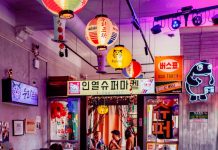When Hamzah Nasser opened in Dearborn in 2021, he received rave reviews from customers for his lattes blended with traditional Yemeni spices like cardamom. But they had one complaint.
âThey wanted gold forks! Can you believe that? Thatâs Dearborn for you,â Nasser says with a wide smile.
Nasser is, by his own admission, an unlikely coffee shop owner. The 37-year-old entrepreneur was born in the central Juban district of Yemen and moved with his parents to metro Detroit when he was 6. His father was a medical student at Wayne State University, and Nasser spent his early childhood in Dearborn living with his grandparents.
Dearborn, Nasser recalls, was different back then, with more Italian and Polish immigrants; one reason he wanted to open a café was to re-create the Dearborn melting pot of his youth.
But he took a circuitous path before launching what he hopes will one day become a coffee empire. In his early 20s, he ran a gas station in East Detroit (now Eastpointe). Those days, he recalled, were ârough, with people getting shot all the time.â He quit within a year to try his hand at being a truck driver.
Trucking enabled him to see America, and he visited 43 states during his seven years in the profession. But trucking also taught him what he did not want to do. He had young kids and hated being away from them. So, in 2019, he sold his three trucks and set his eyes on opening a café.
There was one tiny problem: the COVID-19 pandemic. Construction had to be halted, and Nasser lost $60,000, on top of the $120,000 he initially invested. A year later, he completed a $350,000 renovation and opened his first café on Michigan Avenue, a block away from the .
Dearborn has gone through quite a change from the walled-off area it used to be to the more inclusive version we see today, Nasser says. In the 1960s and â70s, cafés in Dearborn were places where elderly Arab men smoked cigarettes and played backgammon.ÌýNasserâs generation took out the smoking and merged it with a Starbucks model, albeit with an Arab touch. Thatâs where the gold forks come in.
At Haraz Coffee House, one of the most popular drinks is the Adeni chai, a mash-up of Indian masala tea fused with Yemeni tea leaves, cardamom, and cinnamon, an homage to the spice trade between India and Yemen.
Nasserâs customers loved it but wanted it served the way they have it âback home.â That meant nice cups and fancy utensils, as well as décor that re-created a bit of what they left in the Middle East. It also meant late hours, Arabic music, soft lighting, beautiful décor, and kid-friendly spaces.
In the Dearborn location, for example, Nasser and his wife hung up 85 Edison light bulbs and covered the walls in artwork that tells the story of coffeeâs roots in Yemen. They also kept a small area where devout Muslims could pray.
Success was instant. Nasser franchised the cafés, and today there are 12 locations of Haraz Coffee House, including three in Michigan (Dearborn, Detroit, Warren, and one on the way in East Lansing), as well as several in Texas and Kentucky.
Of the 12 owners, only four are Yemeni. Nasser is proud of that fact, as he wants more people to fall in love with the people, the history, and the traditions of Yemen.ÌýHe even created a barista school to train people how to make traditional Yemeni coffee and tea.
This year alone, he has received over 1,500 applications for franchise locations. Some entrepreneurs are already buying up rights to entire states, plus markets in Europe and the Middle East. He believes by mid-2025, he could have 50 locations across the world.
But Nasser doesnât really see himself in the coffee business. What he is selling is community. In mid-November, just over a month into the crisis in the Middle East, Nasser says heâll see a customer staring at their phone and crying.
Dearborn is the 14th fastest growing city in America, growing nearly 15% in the last five years; it is also home to the nationâs largest Arab American population per capita. Many of Nasserâs customers are Palestinian, and he recently donated $15,000 in aid money.
After a suspicious person was caught on camera outside his home, Nasser and his wife now purchase their groceries online only. They also placed their kids in an Islamic school. Sadly, he says, many Muslims and Jews now need to be hypervigilant about their safety. But Nasser has no plans to change the way Haraz Coffee House looks or feels.
âThe funny thing is that business is up, way up,â Nasser says. âPeople come in, they see the Arabic writing, they hear the Arabic music, and they love it. They love it even more now.â
In fact, not only is business up, but his clientele has grown âexponentially more diverseâ since the conflict began. âPeople drive here from all over for what I call the âDearborn experience.â That means the warmth, the traditions, the new flavors. On top of that, they meet people who are proud of who they are,â Nasser says.
On one particular night, Nasser says many of his customers stayed well past the 11 p.m. closing time, trying to make sense of the news and to comfort each other. Thatâs his whole business strategy. âThe money will come,â he says. âI just want people to have a space to gather.â
Food & Drink Recs
Each region of Yemen has its own approach to making coffee, and you will find nearly every version at Haraz Coffee House.
If you are new to Yemeni coffee and you havenât tried coffee mixed with spices, start with its pistachio latte ($7.50), which is served with two shots of espresso, pistachio sauce, and not many spices. If cardamom is more your thing, try its most popular drink, the Haraz latte, which is more spice and cardamom forward.
My (the writerâs) go-to drink is its Adeni chai, a creamy cardamom and cinnamon tea that is an homage to Yemenâs deep trade ties with India. For dessert, most order its famous tiramisu cake, which is a little lighter on the espresso (in case your kids want a few bites).
But I always order the more traditional Yemeni Bee Bites. It is a honeycomb-shaped bread filled with cream cheese and drizzled with honey. It is designed to be shared, although I confess, I have never wanted to share mine.
This story is from the February 2024 issue of ÌÇŴÄvlogḞĠṪṡḞæ. Read more in our digital edition.
|
| Ìý |
|














